What’s stalking your flock? Probably more than you realize! There are so many dangers lurking out there day and night from animals that would like to make a tasty meal out of your chickens. Here’s some ways to identify the dangers and protect your flock.
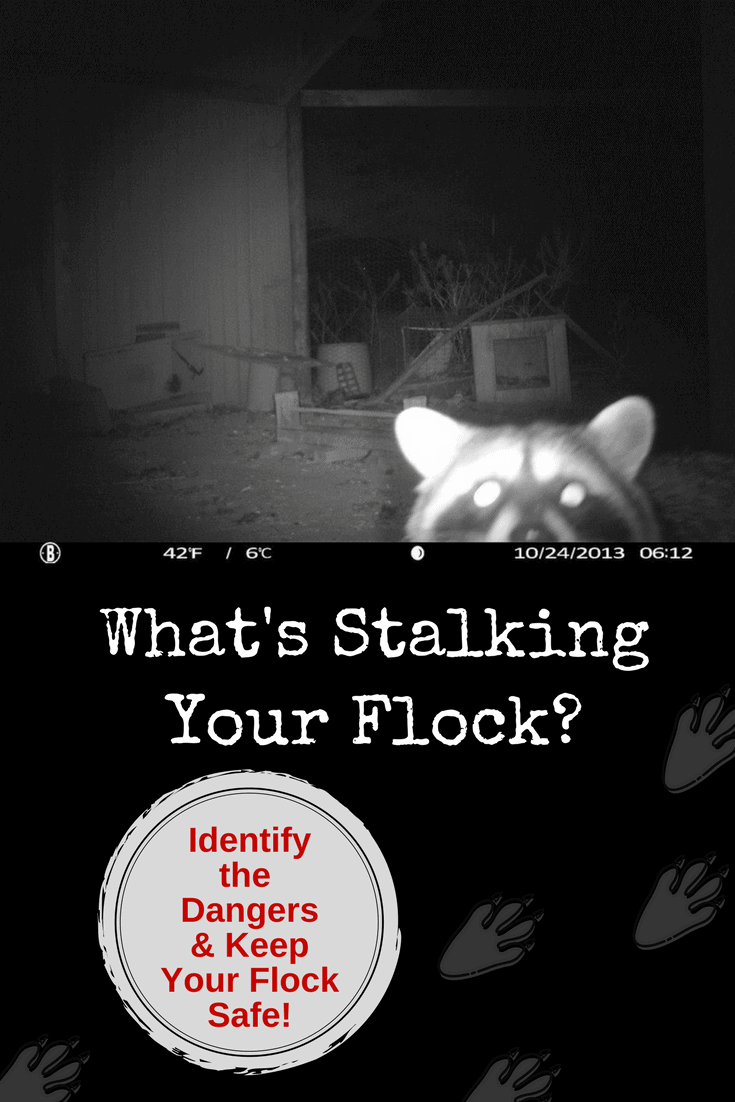
Lately I’ve been hearing about people losing their entire flock in a night by a variety of different predators. Some of these people have been raising chickens for a very long time, so it’s not just some kind of newbie mistake. (One of the hens lost recently was nine years old!) One family I know has been raising chickens in the same location for over 20 years without a single problem, and then lost their whole flock in one night. Another friend lost six hens during the day, while she was home, when some coyotes came into the yard and hauled her chickens off.
I’m not trying to scare you. Not really (only sort of). But predators do pose a serious threat, even in the city. There are all sorts of animals (wild and domestic), many of whom you’ve probably never noticed or given thought to, that would love to have a nice, fresh chicken dinner from your yard.
If you’d rather not be the local animal diner, there are ways to help keep your hens safe. And most of them aren’t even very hard to put into place. While there are a host of animals that pose a threat to chickens, I’m going to focus mainly on the ones more commonly found in the areas where urban flocks live. Many of the precautions are general and work for all predators, but some animals have specific things that will deter them better, so I’ll talk in generals as well as specifics.
Here are some general guidelines:
Secure the Coop and Run
Use hardware cloth on your coop and run. Although it’s more expensive than chicken wire, it’s worth the added expense. (Chicken wire basically only helps keep chickens in. It’s not strong enough to do a very good job of keeping other animals out. (Even little animals like rats can chew through it.) Attaching the hardware cloth to your coop and run using washers and screws also helps keep the hardware cloth from being pulled off the coop/run walls. Don’t forget to cover the coop windows with hardware cloth as well. Window screen is essentially useless (except to keep bugs out).
Bury the hardware cloth about a foot down, all the way around your run. This will help discourage animals from tunneling down under to get inside your coop. You can also fill this trench up with concrete for added re-enforcement.
Alternatively, run the hardware cloth out about two feet from the base of the run and then cover it. This also helps discourage digging.
(I built my first coop and run on top of an old RV pad—I added dirt into the chicken run for padding for the girls, but kept animals from digging down under the walls because the asphalt stopped them.) A similar kind of thing would be to use pavers under the walls of the chicken run, to help keep digging in check.
Add a metal or wood apron around the bottom part of the run. This will help secure the most vulnerable part of the chicken run. Some animals won’t try to dig under with an apron in place because they need to be able to see their prey as they dig. Providing a visual barrier helps deter them.
Cover the chicken run with wire or a roof or both. Netting will keep birds out from above, but other animals can easily rip through netting and climb inside.
Add a chicken yard fence (or backyard fence–some containment) is a good deterrent for stray dogs (this is one biggest killers of urban chickens but we’ve still had a fair share of stray dogs even on the farm). The fencing also helps keep your free ranging chickens in the areas you want them in and away from other areas.
Make sure your latches require multiple steps. Raccoons have amazing hands and can unlatch simple locks and latches. Adding spring lock latches, barrel locks, additional carabiners, etc. will keep them out.
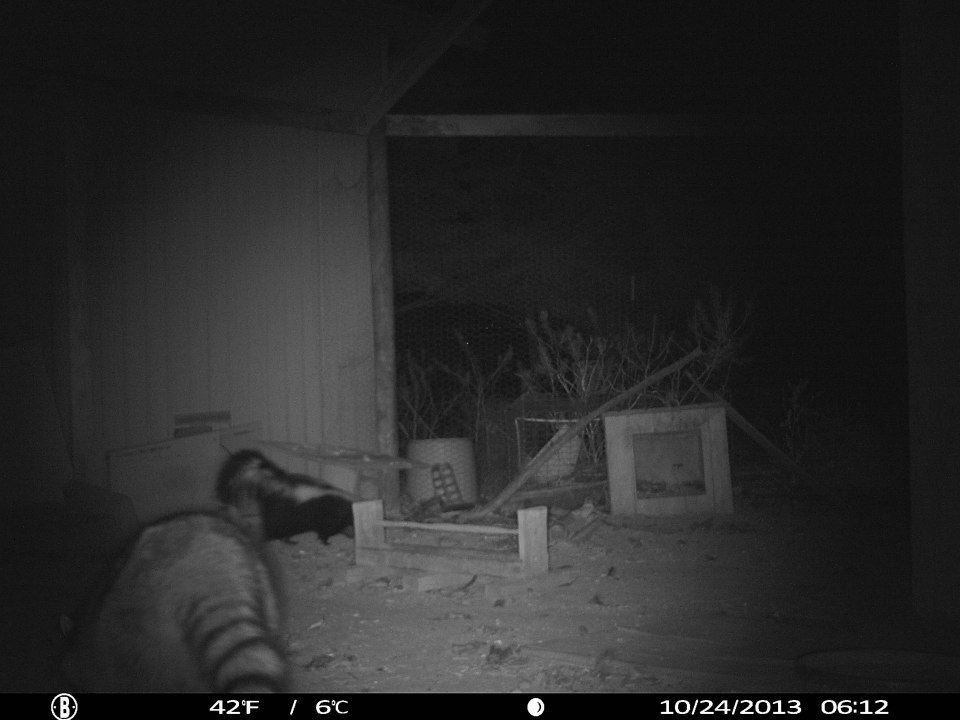
Keep the Chicken Area Clean
Keep the chicken area uncluttered and clean. Dirty, cluttered, food strewn places attract all the wrong things. Rodents love to live and hide in piled up wood, bricks, brush, etc. and are drawn to dirty coops. All animals are attracted to food and scraps. Keeping the chicken coop, run and yard area picked up and less attractive to animals will cut the traffic down.
(I learned the hard way with my compost bin that having non-enclosed bins will attract rats in a big way. And rats multiply at astonishing rates. In every short order, we had a full blown issue that took professional services to eradicate. It was a big mess!)
Pick up fruit as it falls off the trees. Think like an animal needing to forage for their next meal when looking around your yard. What would attract you if you were hungry? Get rid of it or lock it up so they can’t get to it.
Don’t leave chicken feed out at night. (Or cover it up with a rodent guard). If there’s nothing around to eat, the area is way less attractive to animals.
Add Safe Places
Strategically place branches around the area, or plant trees/covering. If you have free range birds, adding shrubs or bunches of branches (that they can crawl into), etc. will give hens a place to run under to gain protection, especially from airborne predators. (This also gives them shade protection in the summer heat, so it’s an added bonus.)
My hens adore a scruffy rhododendron bush in the chicken yard. I’d actually love to cut the sad thing down, but I don’t have the heart to do it because it’s my girls favored place to hang. And I’ve seen it in action as a protection as a hawk as stalked them from above. So, sigh. It will stay, eye sore or not.
All of these general security measures will help keep your flock safer, as well making your property less attractive to hang in. But there are other, specific things you can do when you know which kinds of animals you’re dealing with.
Here are some animal specific guidelines:
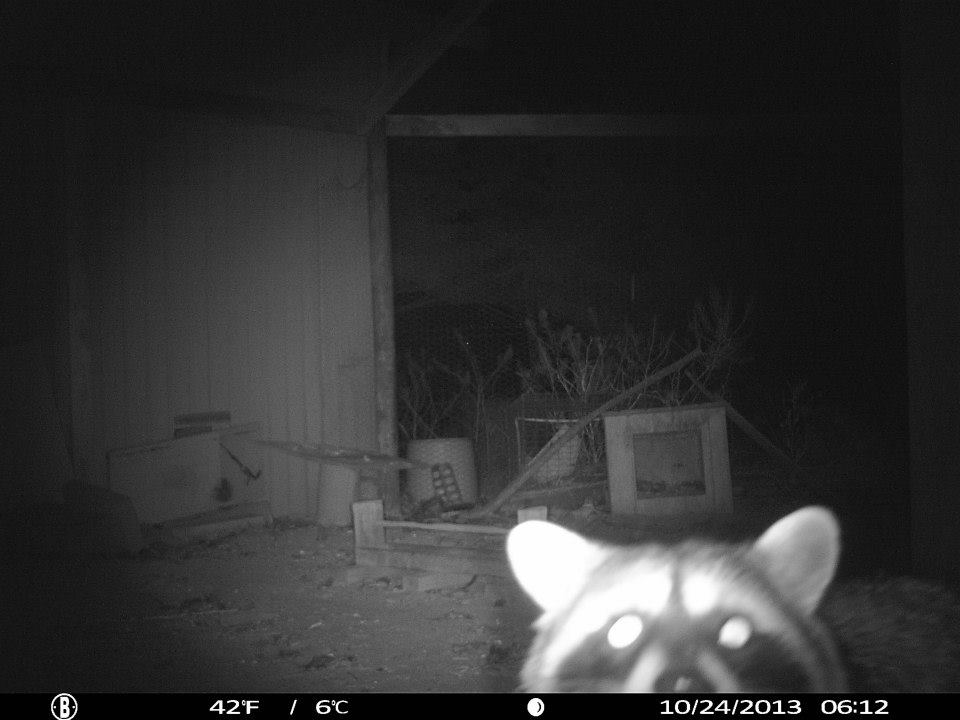
(The following are ideas to use in addition to the ones above, not instead of.)
Raccoons: They’re very smart animals that can open latches, dig tunnels, climb over gates and up walls, and even reach into a run (even a run they can’t break into) and grab chickens. As I mentioned above, adding latches that are raccoon proof is a good idea. This means, a latch that takes more than ONE step to open (or adding a padlock to the latch). I’ve actually had a raccoon reach into a secured and covered chicken run and grab one of my hens, ripping her head off. They have ‘hands’ similar to ours that can do amazing things.
Possums: They don’t like noise and light. Wind chimes, Christmas lights, strobe lights, turning on a radio, etc. are all things that can help keep them away. (And now you have a legitimate reason for keeping your Christmas lights up year round!)
Hawks, owls and other birds: Many of the same things used for possums work also for birds. Add to that, metallic ribbons and CD’s hanging by a string (they glisten in the sunshine). Add a fake owl to the property (like this). Make sure to move it around OFTEN (I usually move mine on odd numbered days so I don’t forget). The threat of an owl is often enough to keep a hawk away–but make sure to move it around to make it seem more realistic.
Real owls are smarter (you know the WISE old owl!) If you just use lights, they’ll eventually figure it out. Keep them guessing. While most owls hunt at night, they DO occasionally hunt during the day and they DO love chicken dinners. (Here’s what happened with my flock the day a Cooper’s Hawk flew into the chicken run!)
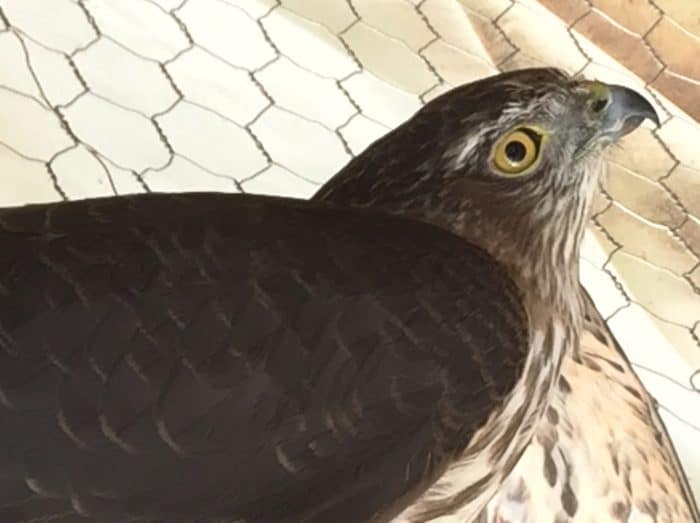
Rats, mice, squirrels and other tiny rodents: Collect your eggs regularly as these types of animals are more likely to feast on eggs than chickens (although they also like chicks and could occasionally take on a smaller hen). Some people set up squirrel feeders on the opposite side of the property to give squirrels a reason to congregate in areas away from the coop.
Coyotes and dogs: They love dog food and garbage. Keep those both picked up. A high fence might help, but some could still jump over. Adding 18-24” of wire, flat on the ground (buried a bit) all around the run can help discourage digging. If the dog belongs to you, make sure he is ‘chicken safe’ before allowing him to be with your flock unsupervised. Some dogs are great with chickens, even protecting them. Others see them as a distraction from boredom and attack them.
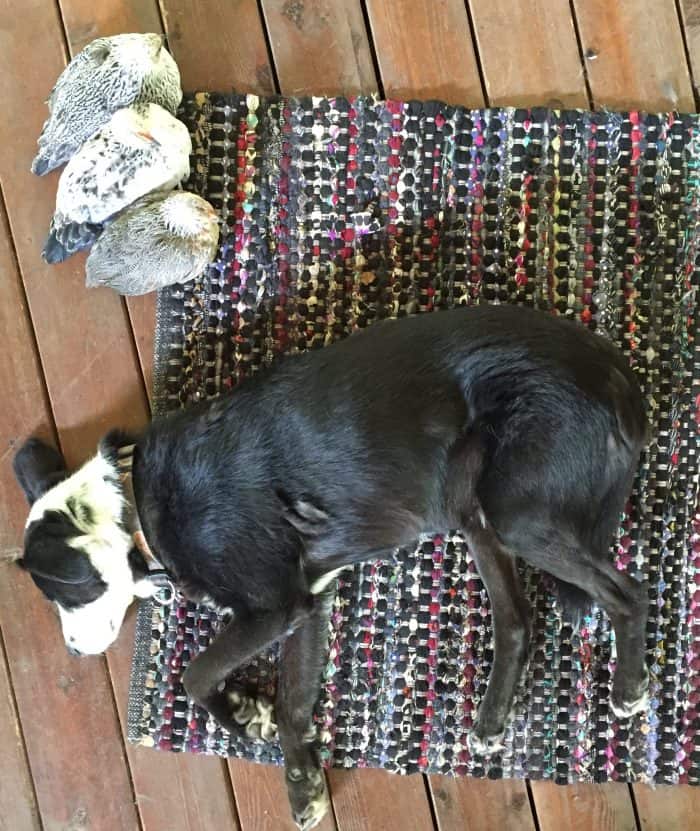
Snakes: Keep the yard mowed and hiding places removed as snakes don’t like to be out in the open.
Other hens: Yes, sometimes the flock needs to be protected from each other, or from things (illness, mites, etc.) that infest them. This, however, is a topic unto itself. Read more about that here.
Of course, taking every precaution available doesn’t guarantee 100% safety for your hens. However, if you put some simple things into place, both you and your girls should sleep better at night. And that keeps everyone happy (except for the wild animals having to look elsewhere for their next meal).
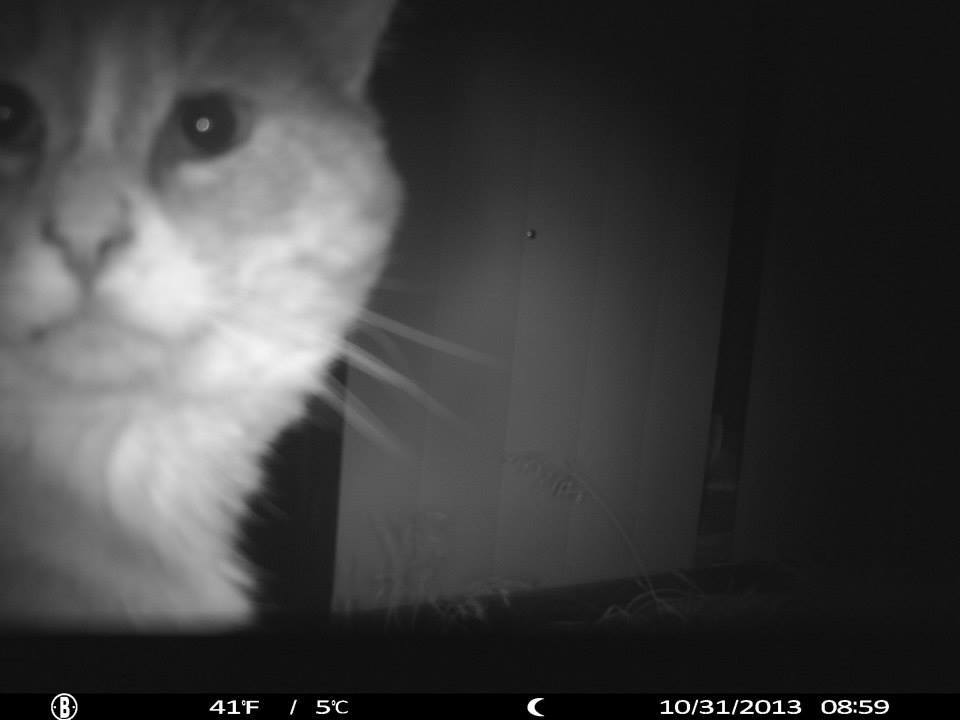
PS Thanks to my brother, CJ for these photos. He captured these pictures outside his coop up in central Washington the night he lost 5 hens to these predators.